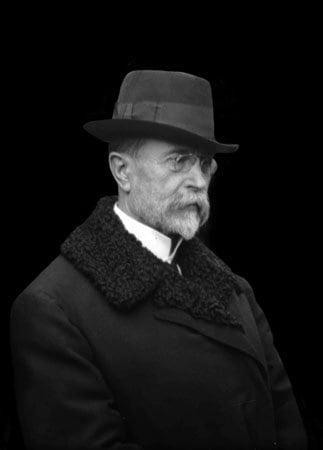24 May 1934 Masaryk becomes president for the fourth time
Categories: Personalities , Calendar
 Masaryk was elected president four times. The last time was on 24 May 1934. However, due to his deteriorating health, he decided to resign a year later in December; the abdication speech was delivered by Chancellor Přemysl Šámal.
Masaryk was elected president four times. The last time was on 24 May 1934. However, due to his deteriorating health, he decided to resign a year later in December; the abdication speech was delivered by Chancellor Přemysl Šámal.
During the winter of 1933 to 1934, Masaryk began to experience considerable fatigue and doctors recommended much more rest and sleep. The next presidential election was approaching, and although he wanted to retire for a well-deserved rest, his political friends finally persuaded him to run for the office of head of state for a fourth time.
A few weeks before the election, however, Masaryk suffered a stroke that affected one eye, his right hand and knee, which meant partial disability. "However, the true state of affairs was concealed from the public, and although the president's health stabilized, his right arm remained paralyzed. His difficulties were compounded by memory problems, and since he could no longer sign with his right hand, he useda special signature stamp," says writer Vladimír Liška, describing Masaryk's health.
With a majority of 327 votes, Masaryk was elected president for the fourth time on 24 May 1934. His only opponent, Klement Gottwald, received 38 votes and 53 were "blank". His personal physician, Dr. Adolf Maixner, stated that his right eye had been almost disabled by cataracts for several years. Masaryk was also forced to run because there was no other suitable candidate. Masaryk considered the tried and tested Antonín Švehl, but on 1 February he ended his political activity due to protracted problems with his heart disease," writes Ivan Kazimour in his book Edvard Beneš without Adoration.
However, other difficulties continued to mount. By the end of the summer of 1935, Masaryk had already suffered several more mild strokes, after which he could not walk well, had difficulty with speech, could not write, and could hardly concentrate on reading. He confused Czech and English words and was dependent on the help of his loved ones, especially his daughter Alice.
The political representation urged Masaryk to stay in office, but the president refused. He knew that he would only be a puppet in the hands of others. He dictated the letter of abdication to his political adviser and Vice-Chancellor Josef Schieszl. Chancellor Přemysl Šámal read it in Parliament on 14 December 1935.
"Masaryk recommended Edvard Beneš as his successor, in whom he had absolute confidence, appreciated his diligence and, moreover, was one of his loyal supporters. He knew Beneš well over the years and saw in him a man who surpassed all other Czechoslovak politicians in his statesmanship. Moreover, both of them were also in harmony with each other in terms of opinion," Liška explains why he recommended Masaryk to Beneš.
Vladimír Liška: Tomáš Garrigue Masaryk - known and unknown, Ivan Kazimour: Edvard Beneš without adoration, www.britannica.com
The article is included in categories: